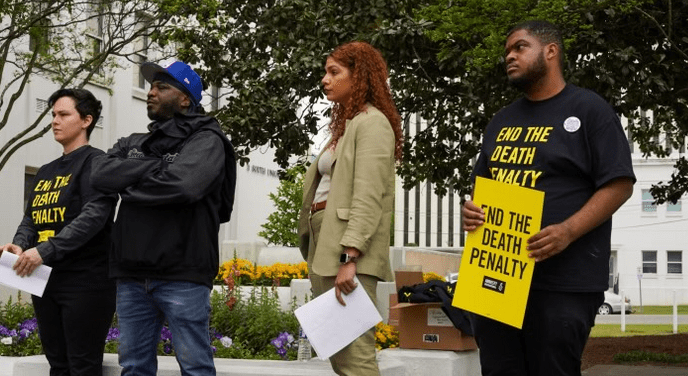Amnesty International delivered thousands of petitions to Alabama Governor Kay Ivey on Thursday, asking her to grant clemency to Rocky Myers, a man who has spent nearly 30 years on death row in Alabama. The delivery is part of Amnesty International’s “Write for Rights” campaign that unites activists around the world in their desire to take action on behalf of people whose human rights have been violated. Worldwide, nearly 700,000 actions have been taken in support of Rocky.
Rocky Myers, a Black man with an intellectual disability, was sentenced in 1994 to death for murder even though no evidence directly linked him to the crime scene. After a jury sentenced Rocky to life without the possibility of parole, the judge overrode the jury and imposed a death sentence through a now outlawed practice called judicial override.
In 2017, as one of her first acts as Alabama Governor, Kay Ivey signed a bill into law that barred judicial override going forward, but the new law was not applied to people already on death row at the time, leaving Rocky and others stranded on death row even though their death sentences would now be considered illegal.
“With a swipe of her pen, Governor Ivey can end the injustice that has tarnished Rocky Myers’ case for three decades,” said Amnesty International’s Alabama State Death Penalty Abolition Coordinator TJ Riggs. “The death penalty is the ultimate cruel, inhuman and degrading punishment, and, pending abolition, we urge her to halt all executions in the state and conduct a review of Rocky’s case as well as others on death row who were sentenced under judicial override.”
The U.S. Supreme Court ruled that defendants with intellectual disabilities “face a special risk of wrongful execution,” which is certainly true for Rocky. Burdened with ineffective legal representation and abandoned by his post-conviction lawyer, Rocky missed deadlines for appeal. There are concerns that racial and class bias also tainted Rocky Myers’ trial, which is in line with the fact that Black defendants are 7.5 times more likely to be wrongfully convicted of murder than white defendants. His execution could be scheduled at any time, and his best hope is for Governor Ivey to grant him clemency.
The petitions were delivered to Governor Ivey after a rally that took place at the Alabama state house, where dozens of people gathered to ask the Alabama legislature to support HB27, a bill that would make the banning of judicial override retroactive, bringing Alabama in line with the rest of the country. In passing this bill, Alabama would be upholding the legal principle recognized under international standards that those under sentence of death should benefit from retroactive leniency in the event of a change in the law after commission of the crime.
Amnesty International opposes the death penalty in all cases without exception – regardless of who is accused, the nature or circumstances of the crime, guilt or innocence or method of execution.

